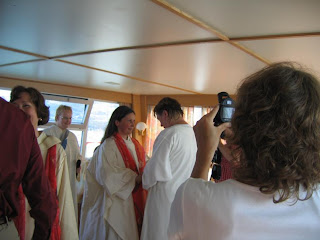 More than few people I know have wondered: “Why haven’t they made Oscar Romero a saint?”
More than few people I know have wondered: “Why haven’t they made Oscar Romero a saint?”
This article attempts to answer that question, and finds some interesting theories:
Archbishop Oscar Romero of El Salvador, the outspoken church leader who was killed in 1980 as he celebrated Mass, has become as polarizing in death as he was in life.
The campaign to make him a Roman Catholic saint appears to be languishing, as Vatican officials privately debate whether Romero was a martyr for the faith or for the political left.
The sensitivity of the issue was clear in remarks last May by Pope Benedict XVI, as he was flying to Brazil, his first visit to Latin America as pontiff.
Benedict told reporters that “Romero as a person merits beatification,” but Vatican officials removed that quote in an official transcript, keeping only the pope’s general praise of the slain prelate as a “great witness to the faith.”
El Salvador was headed toward civil war in 1977, when Romero was appointed archbishop of the capital, San Salvador. Suspected guerrillas and leftist opponents of the military-led government were being killed daily.
The archbishop responded with emotional homilies condemning human rights abuses by the dictatorship and paramilitary groups, and advocating for the many impoverished Salvadorans who were being terrorized.
“Every radio station in Central America was tuned to his broadcast, because what you had was a leader, a man of great passion and intelligence, who was telling the reality as the poor people of Central America perceived that reality,” said Robert White, U.S. ambassador to El Salvador at the time. The day after Romero called on the nation’s military to halt its repression, he was shot while leading worship in a hospital chapel.
But the archbishop’s activism was not universally admired. Romero was pressing for social justice at a time when Vatican officials were battling Marxist-inspired liberation theology in Latin America. The archbishop’s work was of great concern in Rome.
Romero also had a difficult relationship with his fellow Salvadoran priests, and at one point the Vatican received a request to send an apostolic visitor to El Salvador to either replace Romero or appoint a superior to control him, according to Roberto Morozzo della Rocca, who wrote a 2005 biography of Romero called “Primero Dios.” The archbishop’s detractors within the clergy – in El Salvador and Rome – may still oppose his beatification.
It didn’t help that Romero became a political hero in the region; his image routinely appears on fliers next to Che Guevara and Salvador Allende – icons of the Latin American left. Vatican officials worry that elevating Romero could unintentionally advance a political agenda.
“There was the problem that a political side wanted – wrongly to take him as their flag, as an emblematic figure,” Benedict said. “How should we rightly bring to light his persona, shielding him from these attempts to use him? This is the problem.”
Let’s pray it’s a problem that those who are investigating his life can solve. As the pontiff noted, the simple fact that he died while celebrating mass makes him “a great witness to the faith,” and a man of heroic virtue.
Photo: Oscar Romero, from the AP

